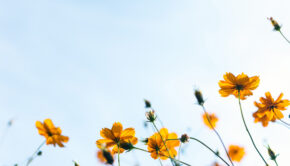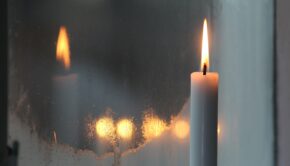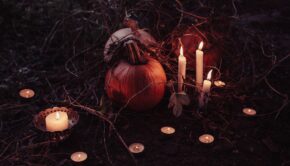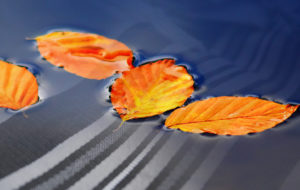A Poem for Rosh Hashanah
I want to share this poem by E. E. Cummings (apparently, contra the myth that he legally changed his name to e e cummings, he actually preferred his name with the normal capital letters). I want to thank Linda Yael Schiller for reciting this poem, at a memorial circle for Shira Shaiman, at Dance New England Dance Camp this August. It was at that time that I was struck by the resonance of this poem with themes of Rosh HaShana.
i thank You God for most this amazing
i thank You God for most this amazing
day: for the leaping greenly spirits of trees
and a blue true dream of sky; and for everything
which is natural which is infinite which is yes
(i who have died am alive again today,
and this is the sun’s birthday; this is the birth
day of life and of love and wings: and of the gay
great happening illimitably earth)
how should tasting touching hearing seeing
breathing any–lifted from the no
of all nothing–human merely being
doubt unimaginable You?
(now the ears of my ears awake and
now the eyes of my eyes are opened)
For me, this beautiful poem speaks deeply about the essence of Rosh HaShana. The Rambam (Maimonides) explained that when we blow the shofar on Rosh HaShana the purpose is to wake us from our slumber. Of course, he wasn’t talking about being physically asleep, he meant awakening to a deeper level of awareness, awakening to a sense of what is beneath the surface, but which is infinitely real: “now the ears of my ears awake/ and the eyes of my eyes are opened”
And, when we are in that state of consciousness, that feeling of being awake and alive, the natural response is one of gratefulness and awe, a sense that we are a small part of something infinite, beautiful and . . . awesome. The High Holidays are traditionally called the Days of Awe, and Rosh HaShana is traditionally called “The Day of Judgment” – Yom HaDin — and in our society which values egalitarianism, self-reliance and the infinite value of each individual, it can strike a negative chord, bringing associations with outmoded ideals of hierarchy, domination, male father figures demanding submission. But, Rosh HaShana is paradoxically both a “Day of Judgment” and also a day of celebration, a day not to fear but to try to be very clear about who I am and where I stand in the world.
I think that this poem captures that intention: I am “human merely being” . . ., I am “lifted from the no of all nothing” — I recognize my limitations; my place as a tiny being that has been given the gift of life. But this recognition isn’t a resigned, fearful or weak feeling of submission. It is, rather, a recognition that I want to remain awake, remain conscious and grateful. It is a feeling that simultaneously acknowledges the vastness of which I am but a small part, while feeling joyful, expansive and alive.
Rosh HaShana is also traditionally known as the birthday of the world, and this newness is reflected in the poem: “and this is the sun’s birthday; this is the birth/day of life and of love and wings: and of the gay / great happening illimitably earth)” There is a sense that everything is renewed, that there is a chance for a new beginning which encompasses the whole wide world, but also myself personally (I who have died am alive again today. . .) When we talk about the “judgment” of whether or not we will be written into the Book of Life on Rosh HaShana this is what we mean: will I be really alive? Will I consciously feel the essence of my life and the beauty of being alive? Or will I be bored, living on the surface, asleep?
Rosh HaShana and all the High Holidays are very focused on God, and specifically the God of creation, the God who brings into being all the earth, the sky, the trees. The old picture of the Creator God, who, In the Beginning, spoke and commanded all the cosmos to appear isn’t one which resonates with many of us today. Yet, this poem captures the idea of the God of creation in a much more resonant way: there is a “yes” that emanates from the world, especially the world of nature. There is no separation between that which is natural and that which is infinite.
That “yes” (which lifts us out of the “no of all nothing”) is what we call God. That “yes” is saying that the world isn’t neutral, inert or random. Rather, as God observes in our creation story: it is good. This is a God within nature, undeniable when we are awake and seeing with the eyes of our eyes. It (S/he?) is a God who we intuitively want to thank and praise – “for most this amazing / day: for the leaping greenly spirits of trees. . .
Whether we are listening to the sound of the shofar, or walking in nature, or reading poetry, this is the time in the Jewish calendar when we are given the invitation to wake up, to see anew, to feel with all our senses, to feel thankful for the renewal that is constantly offered by that “yes” whispering in the trees and the blue true dream of sky.







Pingback: Reflections on Rosh Hashanah | THE POETRY PLACE